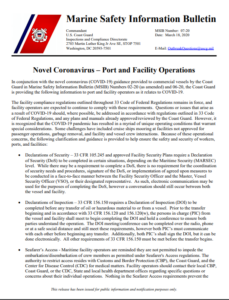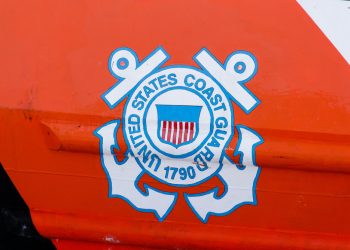The US Coast Guard issued an updated marine safety bulletin concerning the COVID-19, focusing on the efficient implementation of port and facility operations.
The USCG highlights that
The facility compliance regulations outlined throughout 33 Code of Federal Regulations remains in force, and facility operators are expected to continue to comply with these requirements.
The COVID-19 pandemic has resulted to several challenges, such as cruise cruise ships mooring at facilities not approved for passenger operations, garbage removal, and facility and vessel crew interactions. Therefore, due to these operational concerns, the Coast Guard published the following clarification and guidance is provided to help ensure the safety and security of workers, ports, and facilities.
Declarations of Security
It is stated that approved facility security plans, require a Declaration of Security (DoS) to be completed in specific situations depending on the Maritime Security (MARSEC) level. Given that there is no requirement for signatures or any face-to-face interaction, it is recommended that an electronic communication is conducted for the implementation of DoS; Yet, a conversation should still occur between both the vessel and facility.
Declarations of Inspection
For this operation, a Declaration of Inspection (DoI) is required, prior to any transfer of oil or hazardous material to or from a vessel. To mitigate any face-to-face interaction, USCG states that the DOI meeting/conference can be completed over the radio, phone or at a safe social distance and still meet these requirements, however both PIC’s must communicate with each other before beginning any transfer. In addition, the sign of the DoI can also be implemented electronically.
Seafarer’s Access
Maritime facility operators are reminded they are not permitted to impede the embarkation/disembarkation of crew members as permitted under Seafarer’s Access regulations.
Noncompliance
If a situation arises where a facility will not be able to comply with the requirements of 33 CFR 105, the facility must contact the Captain of the Port (COTP) to request and receive permission to temporarily deviate from the requirements.
For example, if a facility will receive a different type of vessel than they normally receive, the facility operator should consider if the dock is physically capable of handling that vessel, and any logistical issues that may arise such as movement of personnel from the vessel off the facility, any medical issues or personnel that may be introduced to the facility, supplies for the vessel, and waste removal from the vessel.
Waste Reception Facilities – Garbage and Medical Waste
Under the law, all ports and terminals under the jurisdiction of the United States are required to provide vessels with reception facilities for garbage.
Therefore, the USCG advises that:
- Reception Facilities: Ports and terminals must be ready to receive any medical waste from any vessels calling at their facility. This means that those ports/terminal with or without a COA for garbage, must provide vessels with adequate reception facilities for medical waste or a list of persons authorized by federal, state or local law or regulation to transport and treat such wastes.
- Vessels: In addition to notifying the COTP, vessels must coordinate with the port/terminal/recreational boating facility their needs for reception facilities for medical waste, 24 hours in advance of their arrival (33 CFR 151. 65(b)), or immediately if already in port.
- COA Waivers: If there are issues or concerns with the health hazards associated with any garbage, reception facilities and vessels should work with the appropriate federal, state, and/or local agencies to determine the actual risks and formulate a plan of action based on information received from those agencies. COTP may also exercise their authority to grant waivers under 33 CFR 158.150, if necessary, to allow for offloading of medical waste or garbage to a reception facility without having a COA.
Concluding, to learn more click herebelow































































